Hello there, fellow dog lover! I’m Dr. Candy, your friendly holistic veterinarian. Today, let’s talk about a topic that’s often overlooked but is vitally important for our furry friends – Rottweiler Dental Health.
As a dog parent, you know how much joy your Rottweiler brings into your life. But did you know that maintaining your Rottie’s dental health is just as crucial as ensuring their physical well-being? That’s right! Dental health plays a significant role in your dog’s overall health.
Just like in humans, poor oral hygiene in dogs can lead to a host of health issues, including dental diseases, painful infections, and even heart disease. And let’s face it, no one wants to cuddle with a dog that has bad breath!
So, whether you’re a new Rottweiler parent or a seasoned one, it’s never too late to start paying attention to your dog’s dental health. Let’s dive into the world of Rottweiler teeth cleaning, common dental health issues, and how to prevent them. Together, we can ensure that your Rottweiler has a healthy, happy, and long life.
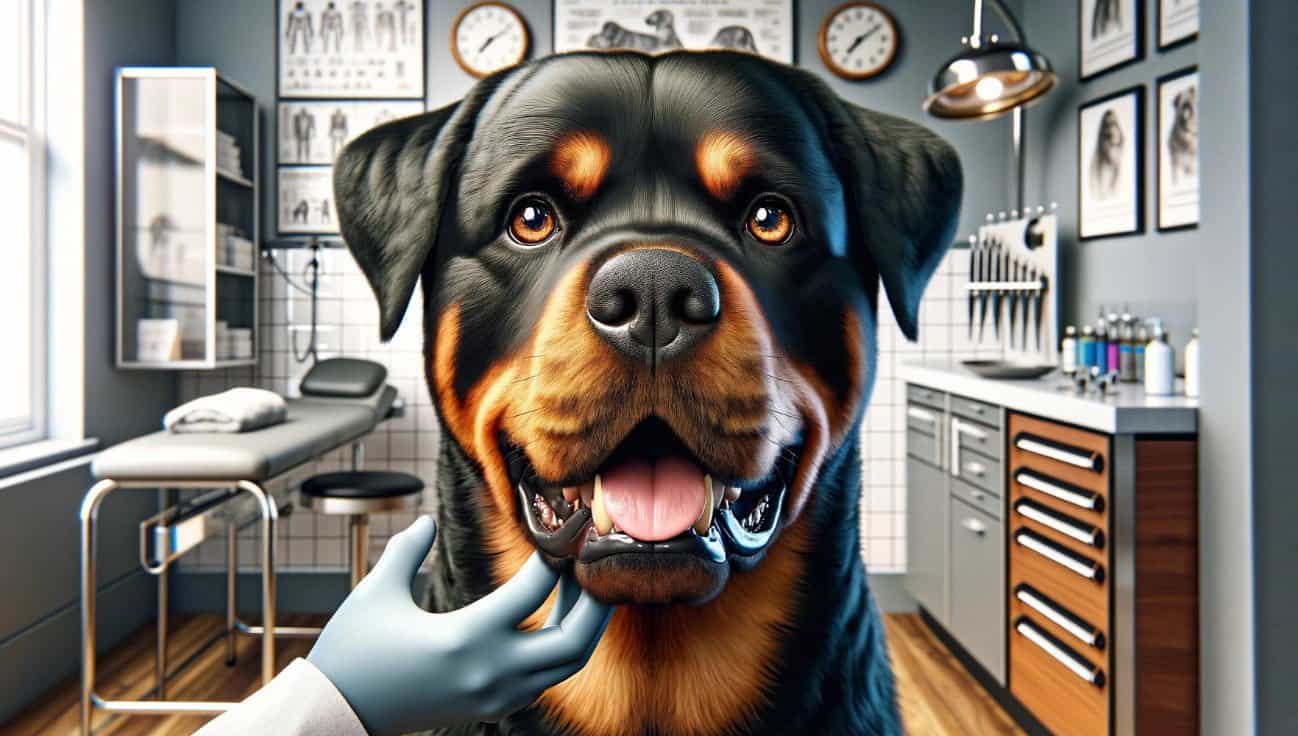
Signs of Dental Disease
As a holistic veterinarian, I believe that the first step towards maintaining your Rottweiler’s dental health is understanding the signs of dental disease. After all, prevention is always better than cure. Here are some common symptoms you should keep an eye out for:
Bad Breath
Contrary to popular belief, bad breath in dogs isn’t normal. If your Rottweiler’s breath is consistently foul, it might be a sign of dental disease.
Changes in Eating Habits
If your Rottweiler is suddenly reluctant to eat, especially hard food, or is eating on one side of its mouth, it could be suffering from dental pain.
Excessive Drooling
While Rottweilers are naturally a drooly breed, excessive or unusual drooling can indicate dental disease.
Red, Swollen or Bleeding Gums
Healthy gums should be firm and pink. If your Rottweiler’s gums are red, swollen, or bleeding, it’s a clear sign of dental disease.
Yellow or Brown Teeth
Discolored teeth can be a sign of plaque and tartar build-up, which can lead to dental disease if left untreated.
Loose or Missing Teeth
Loose or missing teeth are serious signs of dental disease in Rottweilers. If you notice any of these signs, it’s important to take your dog to a vet immediately.
Remember, these signs are often subtle and easy to miss. Regular check-ups and maintaining a good oral hygiene routine can help ensure your Rottweiler’s dental health remains in top shape. As a holistic vet, I also recommend a low-carb diet, avoiding added sugars, and incorporating enzymes from fresh food into your Rottweiler’s diet. These measures can go a long way in preventing dental disease.
So, keep an eye on your Rottweiler’s oral health. After all, a healthy mouth is key to a happy, healthy Rottweiler.
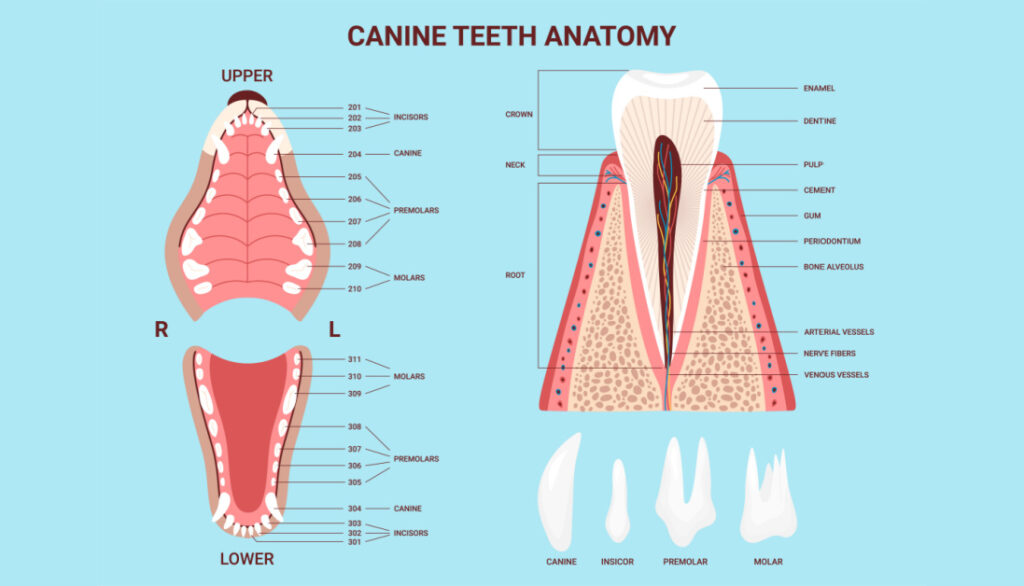
Common Dental Health Issues In Rottweilers
As a veterinarian, I’ve noticed that Rottweiler dental health is often overlooked, despite it being a crucial part of their overall well-being. Rottweilers, like all breeds, are susceptible to several common dental health issues. Recognizing these issues early can prevent further complications and improve your Rottweiler’s quality of life.
Periodontal Disease: This is the most common dental problem in Rottweilers. It occurs when plaque and tartar buildup leads to inflammation and infection of the gums. If left untreated, it can lead to tooth loss and systemic infections.
Broken Teeth: Rottweilers love to chew, and their powerful jaws can sometimes lead to broken teeth. These can be painful and can lead to abscesses if not treated promptly.
Oral Tumors: While less common, Rottweilers can develop oral tumors. Regular dental check-ups can help detect these early when they are easier to treat.
Tooth Resorption: This condition, similar to cavities in humans, occurs when the tooth’s structure is broken down, often leading to tooth loss.
Remember, maintaining good Rottweiler dental health is more than just combating bad breath. It’s about preventing these common issues and ensuring your Rottweiler lives a long, happy, and healthy life. Regular dental check-ups, good oral hygiene practices at home, and a balanced diet are key to achieving this.
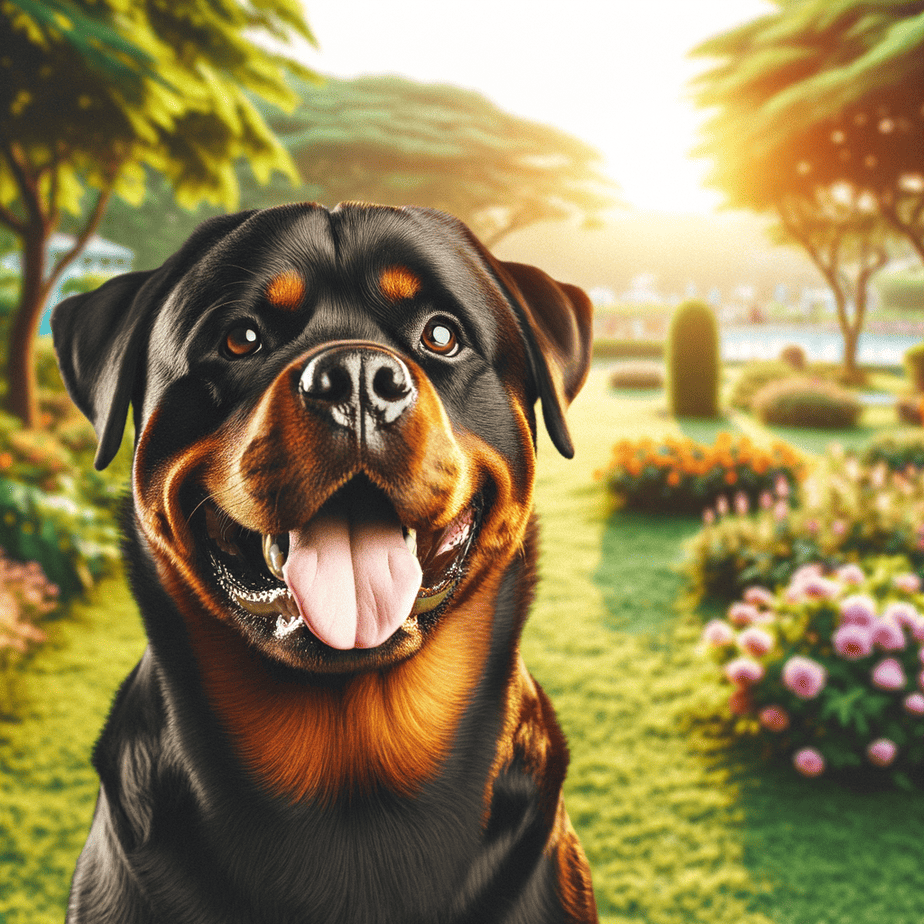
When it comes to Rottweiler dental health, conventional dental treatments play a significant role. One of the most common and effective treatments is anesthetic dental cleanings. This procedure involves putting your Rottweiler under general anesthesia, which allows the vet to thoroughly clean their teeth, both above and below the gum line. This cleaning helps remove plaque and tartar buildup, which can lead to dental diseases if left untreated. It’s recommended to have this procedure done at least once a year to maintain your dog’s oral health.
Anesthetic Dental Cleanings
During anesthetic dental cleanings, a veterinarian will perform a complete oral examination, checking for any signs of dental disease. They will also clean and polish your Rottweiler’s teeth, apply a fluoride treatment, and extract any problematic teeth if necessary. Anesthetic dental cleanings are essential in preventing and treating dental diseases in Rottweilers.
However, while anesthetic dental cleanings are generally safe and effective, they do come with potential individual health obstacles. This is especially true for Rottweilers with pre-existing health conditions.
Potential Individual Health Obstacles for Rottweilers
Some Rottweilers may have heart problems, which can make anesthesia riskier. In such cases, your vet will need to take extra precautions and may recommend an echocardiogram before the procedure to assess the condition of your dog’s heart.
Drug sensitivities are another obstacle. Some Rottweilers may be sensitive to certain anesthetic drugs, which can cause adverse reactions. Your vet will need to carefully select the appropriate anesthetic agents for your dog.
Seizures can also complicate the process of anesthesia. If your Rottweiler has a history of seizures, your vet will need to adjust the anesthesia protocol to minimize the risk of triggering a seizure during the procedure.
Lastly, extreme age can be a factor. Older Rottweilers may have a higher risk of complications during anesthesia, but this doesn’t mean they can’t undergo dental cleanings. Your vet will carry out a thorough health assessment to determine if your senior Rottweiler is fit for the procedure.
In conclusion, while conventional dental treatments are effective in maintaining Rottweiler dental health, every Rottweiler is unique and may have individual health obstacles that need to be considered. Always consult with your vet to determine the best dental care plan for your Rottweiler.
When it comes to maintaining your Rottweiler’s dental health, a holistic approach can be incredibly beneficial. This approach extends beyond just regular teeth cleaning and involves taking a look at your pet’s overall lifestyle and diet. As a vet, I strongly believe in the power of a balanced diet and the right supplements in promoting oral health in Rottweilers.
Diet- Low Carbs, Avoid Added Sugars, Enzymes In Fresh Food
One of the first things I recommend is to focus on your Rottweiler’s diet. A diet low in carbohydrates, devoid of added sugars, and rich in enzymes from fresh food can significantly enhance your dog’s oral health. Carbohydrates, especially simple ones, can stick to your dog’s teeth and lead to plaque build-up. On the other hand, fresh foods such as raw, crunchy vegetables can help clean your dog’s teeth naturally while providing essential nutrients.
- Low Carbs: Foods like lean meats, eggs, and certain vegetables are low in carbs and beneficial for your dog’s dental health.
- Avoid Added Sugars: Sugary treats are not just bad for your dog’s waistline; they can also lead to dental problems. Opt for sugar-free treats instead.
- Enzymes In Fresh Food: Fresh foods contain natural enzymes that can help break down plaque and tartar. Consider adding fresh fruits and vegetables like apples, carrots, and celery to your Rottweiler’s diet.
Oral Health Specific Probiotics
Another crucial aspect of a holistic approach to your Rottweiler’s dental health is the use of oral health-specific probiotics. Probiotics are beneficial bacteria that can help maintain a healthy balance of microorganisms in your dog’s mouth. This balance is essential in preventing the overgrowth of harmful bacteria that can lead to dental diseases.
One product I highly recommend is Probiora for Dogs, an oral health targeted probiotic. This product is specifically designed to promote a healthy oral microbiome in dogs, and it’s easy to use – all you have to do is sprinkle it on your Rottweiler’s food once a day.
Remember, your Rottweiler’s dental health is a crucial part of their overall well-being. By adopting a holistic approach that includes a balanced diet and the right supplements, you can help ensure that your furry friend has a healthy mouth and a happy, long life.
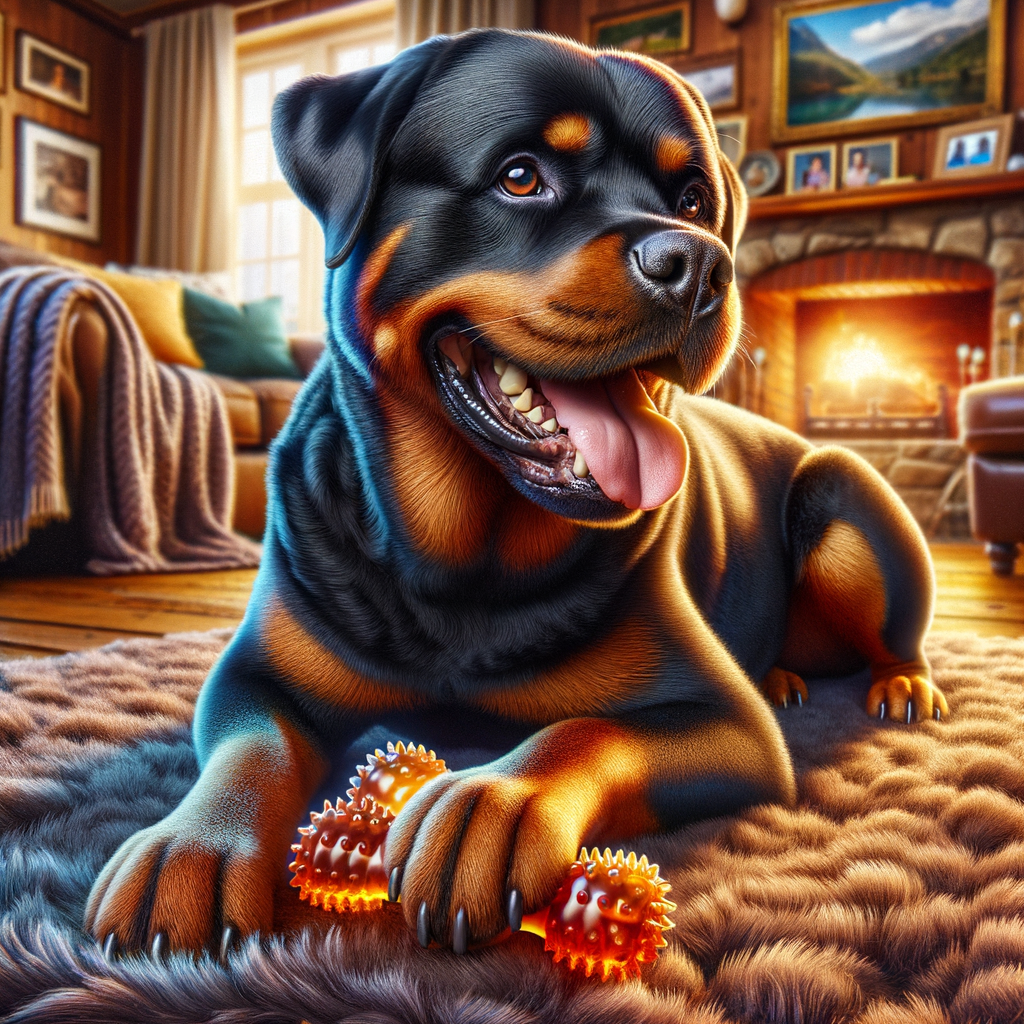
Recommended Dental Chews & Products For Rottweilers
As a pet parent, you may have been swayed by the marketing tactics of commercially promoted dental chews. However, it’s important to understand that these products often fall short of their promises. Not only do they fail to adequately clean your Rottweiler’s teeth, but they also contain unhealthy ingredients such as artificial colors, flavors, and preservatives.
Moreover, some pet parents resort to using drinking water additives to maintain their dog’s oral health. While these products may seem convenient, they can actually do more harm than good. These additives can disrupt the balance of beneficial bacteria in your dog’s gut, leading to digestive issues.
Dr. Candy’s Recommended Dental Chews & Products for Rottweilers
When it comes to maintaining your Rottweiler’s dental health, it’s best to stick to natural, single-source protein products. Here are a few recommendations:
Tendons
Tendons are a fantastic natural chew for your Rottweiler They are tough and fibrous, which helps to scrape off plaque and tartar from your dog’s teeth. Plus, they are a good source of protein and collagen, promoting good joint health.
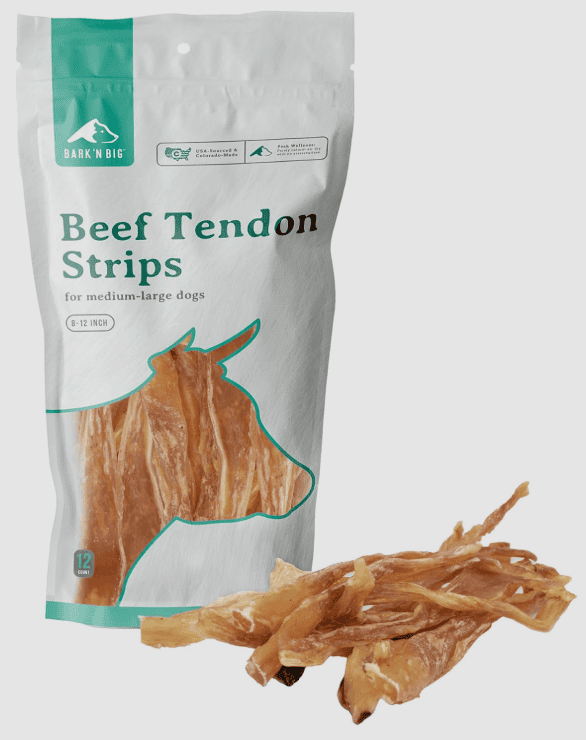
Raw Marrow Bones
Raw marrow bones are another excellent choice for maintaining your Rottweiler’s dental health. They are a natural source of calcium and phosphorus, which are essential for healthy teeth and bones. Furthermore, the act of gnawing on bones can help to clean your dog’s teeth and gums.
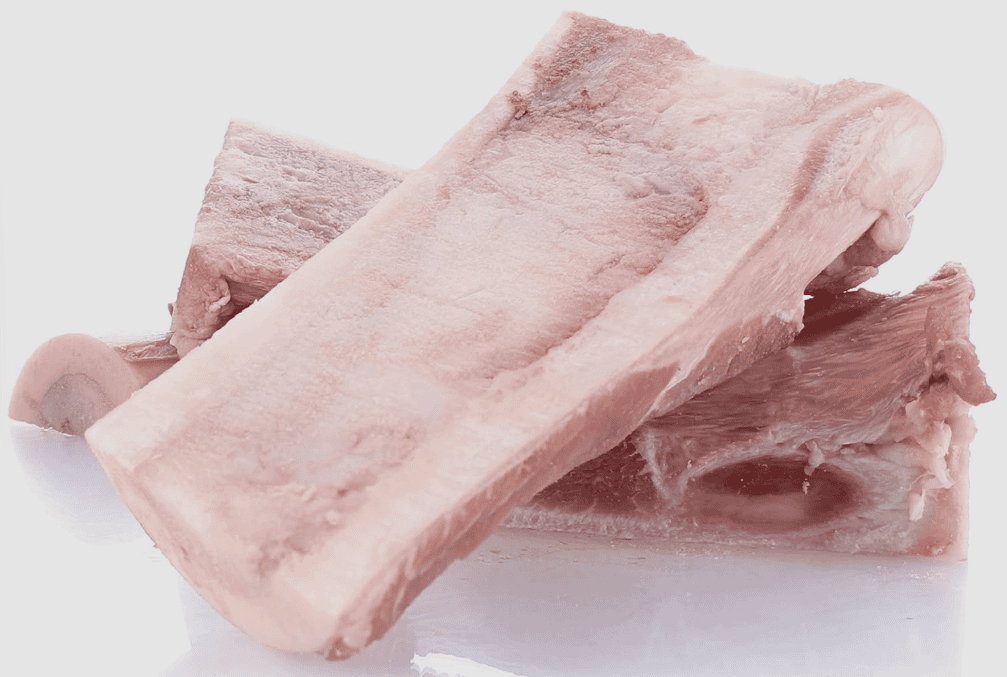
Bully Sticks
Bully sticks are made from 100% beef muscle, providing a natural and digestible chew for your Rottweiler. They can effectively remove plaque and tartar and are a good source of protein. However, always supervise your dog while they’re chewing on a bully stick to prevent any choking hazard.

Remember, while these chews can significantly improve your Rottweiler’s dental health, they are not a substitute for regular veterinary dental check-ups. Always monitor your dog while they are enjoying these chews to prevent any choking hazards.
So, when it comes to taking care of your Rottweiler’s dental health, forget the commercially promoted dental chews, and opt for natural, nutritious alternatives. Your furry friend will thank you for it!
Frequently Asked Questions
1. How can I prevent bad breath in my Rottweiler?
Regular dental care is essential to prevent bad breath in Rottweilers. Brush your dog’s teeth daily using a dog-specific toothbrush and toothpaste. Additionally, provide dental chews or toys that help in removing plaque and tartar buildup.
2. Are there any specific dental issues common in Rottweilers?
Yes, Rottweilers are prone to certain dental issues such as gum disease, tooth decay, and tartar buildup. Regular dental check-ups with a veterinarian are crucial to identify and address these issues early on.
3. Can I use human toothpaste for my Rottweiler’s dental care?
No, it is not recommended to use human toothpaste for your Rottweiler. Human toothpaste contains ingredients that can be harmful if ingested by dogs. Always use toothpaste specifically formulated for dogs.
4. How often should I schedule dental cleanings for my Rottweiler?
It is generally recommended to schedule professional dental cleanings for your Rottweiler once a year. However, the frequency may vary depending on your dog’s dental health and the advice of your veterinarian.
5. What are the signs of dental problems in Rottweilers?
Some common signs of dental problems in Rottweilers include bad breath, swollen or bleeding gums, difficulty chewing, tooth discoloration, and excessive drooling. If you notice any of these signs, it is important to consult a veterinarian for proper diagnosis and treatment.
